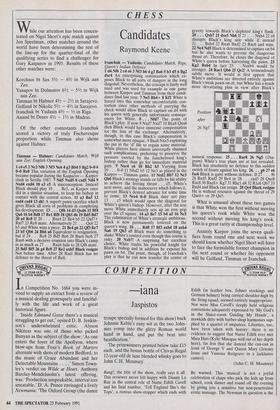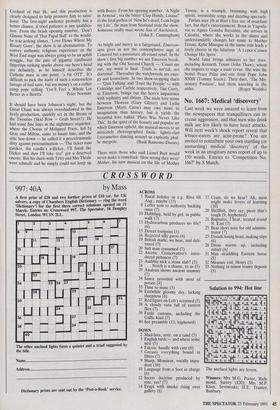COMPETITION
lana
Jaspistos
12 YEAR OLD
ISCOTCH WHISKY n Competition No. 1664 you were in- vited to supply an extract from a review of a musical dealing grotesquely and fanciful- ly with the life and work of a great historical figure.
'Inside Edmund Gosse there's a musical struggling to get out,' opined D. B. Jenkin- son's underwhelmed critic. Alyson Nikiteas was one of those who picked Bunyan as the subject of the show: 'As one enters the foyer of the Apollyon, where blow-ups from Foxe's Book of Martyrs alternate with shots of modern Bedford, to the music of Grace Abundant and her Delectable Mountains . . . .' Simon Town- ley's verdict on Wilde at Heart, Anthony Barclay-Mendelssohn's latest offering, was: 'Production unspeakable, interval ices uneatable.' D. A. Prince envisaged a lively Newmania: 'The Oxford Group (the dance troupe specially formed for this show) back Johnnie Keble's zany wit as the two John- nies yomp into the glitzy Roman world hand in hand, and put the beat into beatification.'
The prizewinners printed below take £15 each, and the bonus bottle of Chivas Regal 12-year-old de luxe blended whisky goes to John C.H. Mounsey.
Bang!, the title of the show, really says it all. This reviewer never felt happy with Danny La Rue in the central role of Nurse Edith Cavell and his final number, `Tell England She's the Tops', a riotous show-stopper which ends with
12 YEAR OLD SCOTCH WHISKY
Edith (in feather boa, fishnet stockings and German helmet) being carried shoulder-high by the firing squad, seemed entirely inappropriate. Nor were Miss CaveLl's deeply held religious convictions adequately expressed by 'My God's in the Sluice-room Guiding My Hands', a mawkish ditty with barber-shop harmonies sup- plied by a quartet of amputees. Liberties, too, have been taken with history: there is no evidence to suggest that Nurse Edith ever met Mata Hari (Kylie Minogue well out of her depth here), far less that she danced the can-can in front of George V and Queen Mary (Jeremy Irons and Vanessa Redgrave in a lacklustre cameo). . • (John C. H. Mounsey) Be warned. This 'musical' is not a joyful celebration of chaps who pick the kids up from school, cook dinner and round off the evening by giving you a sensitive but non-penetrative erotic massage. The Newman in question is the Cardinal of that ilk, and this production is clearly designed to help promote him to saint- hood. The first-night audience probably has a better chance, if tried patience is any qualifica- tion. From the brash opening number, 'Don't Gimme None of That Papal Bull' to the would- be tear-jerking climax, 'Love Flows Where My Rosary Goes', the show is an abomination. To convey authentic religious experience on the West End stage was always going to be an uphill struggle, but the pair of gigantic cardboard fingertips striking sparks above our hero's head are definitely, as he himself describes the Catholic mass at one point, 'a bit OTT'. It's difficult to pick the nadir of such a remorseless farrago of bad taste, but my money's on a rather camp pope trilling 'You'll Feel a Whole Lot Better in a Biretta'. Peter Norman
It should have been Johnson's night, but the Great Cham was always overshadowed in this lively production, quirkily set in the Bronx of the Twenties (Skid Row = Grub Street?). He had some fine lines in the nightmare sequence, where the Chorus of Maligned Poets, led by Gray and Milton, came to haunt him; and the attic hoe-down — he called it a proceleusmatic ditty against procrastination — The ticker runs quicker, the candle's a-flicker, I'll finish the Dicker and then I'll take tea!' got a deserved encore. But his duets with Tetty and Mrs Thrale were schmalz and he simply could not keep up
with Bozzy. From his opening number, 'A Night in Armour', via the bitter 'Clap Hands, Louisa!' to the final pathos of 'Now he's dead, I can begin my Life', the man from Scotland stole the show. Someone really must wrote Son of Auchinlech.
(John E. Cunningham)
As bright and merry as a fairground, Emerson- iana gives us not the contemplative sage of Concord but a passionate all-round rebel. In the show's first big number we see Emerson break- ing with the Old Second Church — 'Count me out, my word is final. Truth is nat'ral, not doctrinal'. Thereafter the watchwords are ener- gy and iconoclasm. In two show-stopping duets — 'Quit Talking' and 'Trust the People' — with Coleridge and Carlyle respectively, Tim Curry, as Emerson, brings out the hero's impatience with sophistry and elitism. The nude love scene between Thoreau (Gary Glitter) and Lydia Emerson (Marti Caine) may owe more to imagination than history, but it yields the beautiful love ballad 'Plato Was Never Like This'. In the spirit of the homely and popular art which Emerson upheld, the musical moves to an intricately choreographed finale: lightly-clad Lyceumettes dancing around an explicitly phal:
lie maypole. (Basil Ransome-Davies) There were those who said Lionel Bail would never make a comeback. How wrong they were! Mother, his new musical on the life of Mother Teresa, is a triumph, brimming with high spirits, irresistible songs and dazzling spectacle. Purists may jib at Bart's free use of mundane fact, but that's entertainment. Born in Yugosla- via as Agnes Gonxha Bojaxhiu, she arrives in Calcutta, where she works in the slums and understandably changes her name to Mother Teresa. Kylie Minogue in the name role leads a lively chorus in the hilarious 'A Leper Cannot Change His Spots'.
World fame brings admirers to her door, including Kenneth Tynan (John Thaw), whom she inspires to stage a nude revue. She wins the Nobel Peace Prize and one from Pope John XXIII (Tommy Steele). Their duet, 'The Mis- sionary Position', had them kneeling in the



















































 Previous page
Previous page